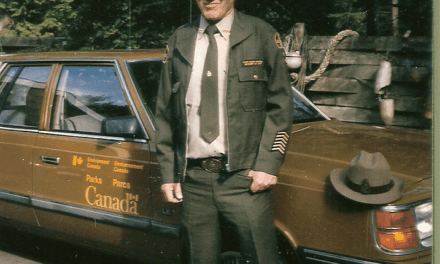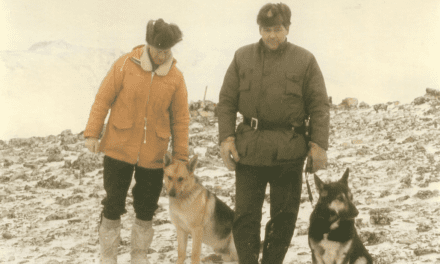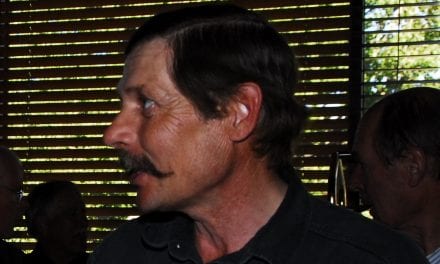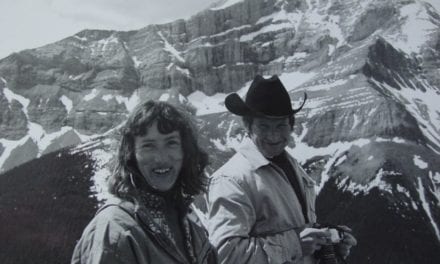Park Warden Alumni Society of Alberta Thank you to the Whyte Museum of the Canadian Rockies for granting permission to the Park Warden Service Alumni to post this interview on our website
Park Warden Alumni Society of Alberta
Oral History Project – Winter 2013
Interview with Duane and Donna Martin – Canmore, Alberta
Conducted by Christine Crilley-Everts
February 27, 2013
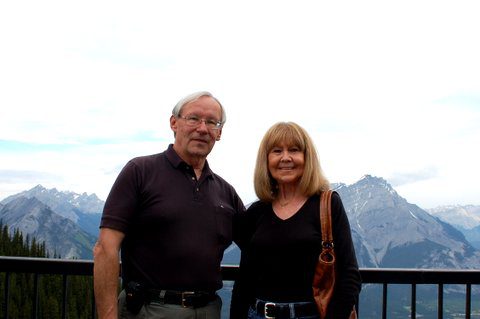
Place and Date of Birth: Duane and Donna were both born in Alberta in 1945. Duane on the 12 of January and Donna on December 12.
Occupations: After spending a few seasons with the Alberta Forest Service, Duane successfully applied in 1966 for a seasonal warden position in Waterton National Park. From there with his new wife Donna and young son, Darren, the family moved to Saskatchewan River Crossing in Banff where he worked as a park warden one, for two and a half years. After taking three years off from the service and completing the resource conservation program at Lethbridge Community College, Duane returned to the warden service in Jasper. By 1975 he was an Assistant Chief Warden in charge of law enforcement and resource conservation. In 1981, the family headed to Ottawa where Duane worked as the first National Warden Service Coordinator in Canada. Following six years in the capital region, they returned to the west where Duane served as a regional law enforcement specialist, playing a very active role in establishing law enforcement training standards for park wardens that were similar to those of the RCMP. In 2007, after receiving a Peace Officer’s Exemplary Service medal from the Governor General, Duane retired.
Along with doing all the duties of warden’s wife, Donna worked as an office manager for a group of doctors in Ottawa, a job which she loved. She then worked for 15 years as administrator at DelMar College in Calgary.
Additional Information: For Duane and Donna, being part of the warden service was a way of life. They both feel that they belonged to a family that was in its golden years. Along with the variety of experiences, the people they worked with and met including Prime Minister Pierre Trudeau, and their travels across the country, they have many wonderful memories of their warden days.
When were you born?
(0:17) Duane – I was born January 12, 1945 in Edmonton.
“And you Donna?”
(0:27) Donna – December 12, 1945 in Didsbury.
“Did you both grow up in Alberta?
(0:38) Duane – Yes, we both did.
(0:39) Donna – I did. I was only born in Didsbury, and then I lived in Taber.
(0:57) Duane – We met in Olds, Alberta, that was kind of my home town, through friends at a party one night. We kind of got together and then it went from there.
(1:08) Donna – He played a guitar and he drove a white MG convertible!
(0:19) Duane – So I think it took her a while to like me for me and not just my toys!
.
“So from Edmonton did you move with your family to Olds?”
No, I was born in Edmonton, but I was put up for adoption. I had an adoptive family. They settled in Olds just about the time that I started grade six. I went all through school in Olds. From being born and being adopted, we moved around to smaller towns over four or five years and then landed in Olds. That was kind of my hometown from then on.
“What did you do before you became a warden?”
(2:02) Duane – I worked for the Alberta Forest Service. I spent a summer in a lookout tower up in Fort McMurray and followed that up the next season in Rocky Mountain House as a radio operator…I had applied for a job with Parks Canada in 1966 and I was accepted as what they called a seasonal warden back in those days. I got posted to Waterton. We got married in November of 1965. I ended up in Waterton with a new wife who had never lived in any kind of wilderness circumstances and a six month old baby. We were stationed at a cabin called Hell Roaring. It was on the east side of Waterton Lake. We had to get back and forth to town by boat. We lived in a one room cabin for that first summer.
“Was that quite an adjustment, especially with a new baby?”)
(3:26) Donna – It seemed like a summer holiday.
(3:29) Duane – Until we opened the cabin and discovered there was about two inches of dead flies that we had to clean out first. It was fairly rustic! It was interesting to see some days with the lake being really rough Donna didn’t trust the park boat. It was a really good solid boat, but she didn’t feel comfortable, so we would take the tour boat down to the end of the lake and on the way back they would stop at the dock and let her out. It was always very interesting to go back to town on the boat and hear these tourists says, “Why is that teenage girl being left in the middle of nowhere with a baby?” They couldn’t believe it! They just saw this tiny little cabin and this young girl with a baby get off. So it was interesting! It was a bit of an adjustment, but it was a really good summer.
“Did you have experience with horses?”
(4:34) Duane – I had a bit, I worked over a couple of summers part-time with a guide and outfitter out around Sundre. I did some trips with him and some basic packing. I wasn’t a real horse guy by experience. I liked the outdoors. Before my interview with Parks, I bought the book Horses, Hitches and Rocky Trails. That was a beginner’s guide on how to pack and do basic horse work. So that was kind of my bible. At the interview there were three Chief Wardens in their dress uniforms, sitting there very formal looking. They asked a lot of basic questions, more related to outdoor living and firing guns and experience that way. They had a little mock up pack horse at the side table that you had to pack. That was the big test. I think if you told them everything else that they wanted to know, but didn’t pack that horse right, you were done. You would never become a warden. I made it through and they offered Waterton and we spent the summer there. In the fall time I got offered a permanent position as an assistant park warden, I was a beginner park warden and we got stationed to Saskatchewan Crossing in Banff, up the Banff Jasper highway…
“Do you remember who the Chief Wardens were at the interview?”
“I have heard that Hal Shepherd was quite a character.”
Jimmy Simes was the warden service officer of the day I believe it was Max Winkler and Hal Shepherd. They were the three who were there. He was a very different man, for sure.) He was one of those characters that they eventually drummed out of the organization. I guess liability wise you couldn’t keep people like that around. It kind of spoiled the organization for a while because we had some real characters, the stuff of legends. I guess you would never get away with that now.
“As an assistant warden was that seasonal as well or was that year round?”
(7:31) Duane – As an assistant warden, yeah that was year round. They had seasonal wardens who would work anywhere up to six months and then the assistant warden was the first level of permanent warden and they had the park warden which was the next level…It was assistant park wardens and they were called park warden ones and park warden twos.
“And you had one child? A little girl or a boy?
Yeah, a boy.
“How long were you at Saskatchewan Crossing and what were some of your responsibilities at Saskatchewan Crossing?”
(8:17) Duane – Two and a half years. Patrolling the highway, patrolling the backcountry We had sort of destination trails, it wasn’t like in Banff and some of those places where you could do loop trails and have a district with trails scattered throughout. These were really kind of destination trails, up the valley and that, so it wasn’t long patrols or anything. I cut my teeth patrolling there initially with the horses and learning how they worked. A lot of maintenance work, painting fire equipment and painting the basement floor for the warden when he went away…There was another warden there – Gerry Lyster started out.
(9:31) Donna – He was a nice man.
(9:36) Duane – The old time cowboy kind of warden. A really good guy to learn from…He had lived that life and he was so experienced.
(9:44) Donna – I felt like they were fabulous neighbors because it was really a long way from anyone, for me at that time.
“Would you and your son go with Duane on patrols?”
No, we were left behind! When the men were gone, we were the ones who answered the doors and sealed the rifles. Sometimes at two or three o clock in the morning (there would be knock at the door) and I was petrified. But I had a big, nice, beautiful German shepherd and she wouldn’t let anybody in.
(10:23) Duane – Yeah, they kind of got two for one for so many years with warden families.
(10:26) Donna – They did. And after a certain time at night the phone didn’t work anymore.
(10:33) Duane – There were no dispatchers (after hours). The old forestry phone line that went into Banff had a warden dispatcher there for a while, but they didn’t work all night long. So after a while there was nobody to call. Other wardens were on the line and sometimes they’d respond, but you couldn’t get through to town and report an accident or something like that. You were kind of on your own.
(11:03) Duane – When we first came there was a seasonal warden as well.
(11:09) Donna – Larry Gilmar.
(11:09) Duane – Larry Gilmar and Pat his wife at the time were out there. He was a seasonal warden for his first season. He was a handy guy to have around, you know, when I was away. Darren fell and hit the corner of the coffee table and cut his mouth, so Larry drove him into the hospital.
(11:29) Donna – Everybody looked after each other.
(11:31) Duane – Yeah you did. It was definitely a family.
(11:38) Donna – It is a real family. It doesn’t matter if you knew them before or not. You had so much in common.
(11:46) Duane – Or if you had differences as well. There were all kinds of differences and different attitudes and philosophies, but when we needed to come together we always did.
(12:09) Duane – I just kind of found as a young guy…I was expecting more out of Parks Canada. They were still coming out of the cowboy warden age sort of thing. They were starting to move people out of the backcountry districts. We did get offered at one time…
(12:37) Donna – To go to Indianhead.
(12:38) Duane – Yeah, to go to Indianhead as a backcountry district. It is very isolated and with Donna (and Darren)…
(12:43) Donna – And with the riding horses, you had to cross a couple of creeks and stuff with a baby.
(12:48) Duane – And then live out there and then I would be gone on patrol…and she was at the main cabin and on her own.
(12:54) Donna – If we had to go there I would be living with his mom and dad or something and he would have had to come out and see me.
(13:01) Duane – We were just at the tail end of that. We turned it down.
(13:05) Donna – Which Bob Hand wasn’t very happy about.
(13:09) Duane – I think after that point I kind of thought, “They are not as progressive as I would like to see.” So I actually left. I made a decision to leave the warden service and went into private business for about three years. And then really missed it, so I talked to folks in Parks to see about coming back. They said, “Well, it is changing they are starting to look for more education from technical school and stuff. So we made the decision to go back to Lethbridge and I took the program there, the Resource Conservation Program at Lethbridge Community College. And I completed that in 1973 and then got stationed at Jasper. I was lucky that they were hiring seasonal wardens. But I guess with my previous experience I was one of the few that I know of from that era when I got hired, I got hired into a permanent position which was nice. I didn’t have to go back to that years and years of seasonal work or employment…That was good so we moved to Jasper in 1973 and we were there until 1981.
(14:35) Donna – We left at the end of 1981. In Jasper we got a really nice spot…at the Fish Hatchery. Some people weren’t too happy…
(15:01) Duane – Some who had been there for years, paid their dues and these new young folks come in and just get plopped into this nice place. It wasn’t our choice but…We were at the Fish Hatchery for about a year and a half.
(15:43) Donna – In 1980 we moved into town…
